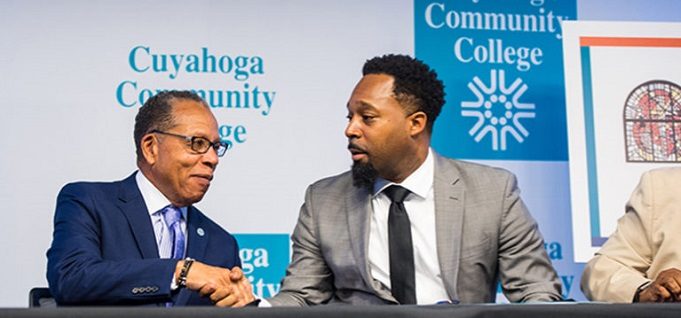Church partnerships promote community engagement
By Ellie Ashford
February 19, 2020
Working with the faith community allows colleges to raise awareness of the educational opportunities available to parishioners.
Community colleges intent on establishing strong connections within predominantly African-American neighborhoods are finding success through partnerships with faith institutions.
“Our faith community has relationships with people who attend their houses of worship in a way that we don’t,” says JaNice Marshall, vice president for access and community connections at Cuyahoga Community College (Tri-C) in Ohio.
Tri-C’s engagement with churches aims to “raise the level of awareness among parishioners and connect them with opportunities for academic and workforce programs,” Marshall says. “These efforts help parishioners understand what we offer, and what they need to do to be ready for college.”
An expanding effort
Tri-C’s interfaith community engagement initiative started six years ago with a partnership with Olivet Institutional Baptist Church. The college launched three Tri-C Access Centers in 2019 to expand its outreach in communities gripped by poverty.
One is co-hosted by the Olivet Housing and Community Development Corp., an arm of the Olivet church. It is also a partnership with the Cuyahoga Metropolitan Housing Authority. The others are based at the office of Esperanza Inc., a nonprofit that serves the Hispanic community, and Metro Health Medical Center.
“Bringing the community college experience and resources to these sites removes barriers to higher education,” says Tri-C President Alex Johnson, who also serves as chair of the American Association of Community Colleges’ (AACC) board of directors. “Tri-C is meeting residents where they are to help them pursue degrees, workforce credentials and the opportunity for a better life.”
Tri-C offers a one-credit workforce success seminar at the Olivet Access Center that informs potential students about the pathways offered at the college, what courses they need and how to create a plan for attaining a degree or certificate, Marshall notes.
The Access Centers also provide workshops on GED completion, college and career readiness, workforce training, financial aid and the Women in Transition series, which covers personal development and career exploration.
Tri-C also connects with churches through its Interfaith Community Service Initiative. Faith-based organizations that sign up as formal partners with the college receive periodic updates about educational and training programs to share with parishioners.
In addition, Tri-C hosts workshops and classes at churches, including Aspire sessions, which aim to help adults attain a high school diploma or GED.
A LIFE line to college
“As an educational institution, it’s our goal to help create a pipeline for students to attend college,” says Timothy Beard, president of Pasco-Hernando State College (PHSC) in Florida.
To better reach potential students in African-American neighborhoods, college leaders invited local pastors to a meeting at a church where they talked about PHSC programs and encouraged them to visit the campus.
PHSC’s faith-based initiatives target predominantly African-American churches in an attempt to reach students from economically disadvantaged backgrounds who would be the first in their families to attend college. All types of faith institutions are involved, not just Christian ones.
Because a sizable population in the community hasn’t graduated from high school, the college and five houses of worship developed satellite centers to provide GED programs, testing, tutoring and counseling. For people who have a diploma, the centers offer college readiness assessments and college success programs.
PHSC started the Linking in Faith and Education (LIFE) program three years ago. It now involves 75 faith-based institutions.
The LIFE program was developed and is coordinated by Rev. Emery Ailes III, the pastor at Pristine Spring Hill Baptist Church. He is also an adjunct humanities and religion instructor at PHSC and is working on a doctoral dissertation about linking faith and education.
LIFE hosts monthly summits – on campus or at local churches – on such topics as educational opportunities, the opioid crisis, mental health and veterans’ issues. Panelists typically include college officials, students, faculty, pastors, parishioners and community members.
A LIFE Spirit and Wellness Summit scheduled for February 20 is on the topic “Combatting Substance Abuse in Youth,” and features an opioid expert from the federal Drug Enforcement Administration, the PHSC board chair, a substance abuse counselor and mental health experts.
The summits often feature personal stories with an emotional impact. For example, at a previous event on mental health, a church leader spoke about the suicide of his son.
“That pastor is coming from a very dynamic place, place of lived experience,” Ailes says, and that puts him in a better position to help students dealing with stress and anxiety.
There’s more to the story! Read the full article in CC Daily.


